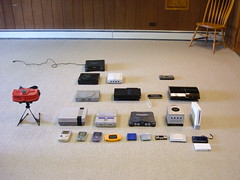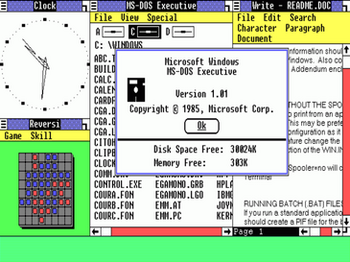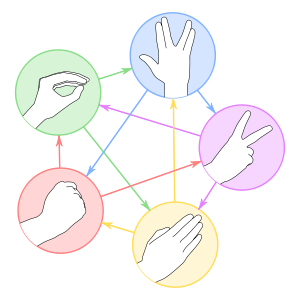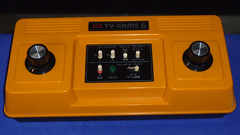The poor fools over at TechTalk radio exposed my idiocy to the Chicagoland airwaves again and our conversation wandered into the history of video game consoles. Specifically, exactly how long Nintendo, Sony and Microsoft have actually been making consoles -- and what was the only generation of home gaming rigs that this trio entirely sat out.
Fortunately the balance of the show was spent discussing more substantive matters, like why -- exactly -- Snapchat thought Facebook's $3 BILLION buyout offer was too chintzy to accept. The parts where I'm not talking are certainly worthwhile, so give a listen.
If you've not suffered enough, the unabridged history of my podcasted buffoonery is listed here.
The personal blog of Jay Garmon: professional geek, Web entrepreneur, and occasional science fiction writer.
Showing posts with label Microsoft. Show all posts
Showing posts with label Microsoft. Show all posts
Tuesday, November 26, 2013
Monday, September 16, 2013
The TechTalk episode where I talk about the secret history of Steve Ballmer
In this TechTalk radio episode, I reveal what dark history Steve Ballmer lived out between his days at Harvard and his illustrious run as a minion of Microsoft. Here's a hint: it involved a midwestern state, pastries and another legendary Fortune 100 CEO. No foolin'.
Mercifully, we spent much more of the episode discussing Oyster and its "Netflix for ebooks" pitch, as well as the future of the prose-for-pay industry. The parts when I'm not talking are definitely worth a listen.
As always, my complete archive of podcasted misdeeds is available here.
Mercifully, we spent much more of the episode discussing Oyster and its "Netflix for ebooks" pitch, as well as the future of the prose-for-pay industry. The parts when I'm not talking are definitely worth a listen.
As always, my complete archive of podcasted misdeeds is available here.
Related articles
Tuesday, July 26, 2011
What 2 modern game console rivals almost collaborated on a single game system?
 Image by Andrew-LGP via FlickrOnce again, I posit a question in the form of Geek Trivia in not one, but tow different formats. You can learn which of the modern console-cranking triumvirate -- Sony, Nintendo and Microsoft -- almost tag-teamed the video game market in efficient text form in my latest Geek Trivia column on TechRepublic's Geekend blog.
Image by Andrew-LGP via FlickrOnce again, I posit a question in the form of Geek Trivia in not one, but tow different formats. You can learn which of the modern console-cranking triumvirate -- Sony, Nintendo and Microsoft -- almost tag-teamed the video game market in efficient text form in my latest Geek Trivia column on TechRepublic's Geekend blog.If you want to auditorially luxuriate with the question, check out my TechTalk radio version of the tidbit, with additional content on Bitcoin, public education and other web-based minutia of interest.

Monday, November 22, 2010
What were the original system requirements for Windows 1.0?
 |
| Windows 1.0, the first version, released in 1985 (Photo credit: Wikipedia) |
What made Windows successful? A number of factors, but primary among them was the availability of third-party apps for the OS and immediate support for color monitors. Of course, it wouldn't be a Windows operating system if these advantages didn't come with a hefty hardware requirement.
What were the original system requirements for Windows 1.0?
Saturday, October 30, 2010
'Three Unorthodox Ways Obama Can Fix The Economy Even With A Republican Congress' ... +11 more must-read links
- Three Unorthodox Ways Obama Can Fix The Economy—Even With A Republican Congress
- The most dangerous phrase in data security: ‘It can’t happen to me’
- Archive Of Geocities Released As A 1TB Torrent
- Dear Entrepreneur: Think Cash, Not Ideas
- Twitter moods can predict the stock market
- New privacy czar might have Google's hardest job
- Win A Trip To Napa For Your Team, Courtesy Of HP
- Damn Good Reminder: If You Run A Blog, Register For DMCA Protections
- Parents Television Council Accused Of Dumping Petitions, Just Focused On Cash
- It’s Kinda Rough For MySpace Over on Quora
- Friday YouTube: Big Bang Theory - Rock, Paper, Scissors, Lizard, Spock
- Using Firesheep as a hacking tool is illegal in the US, UK, and most of the world
 Image via Wikipedia
Image via Wikipedia

Friday, October 29, 2010
'Google Is Now Providing Servants to Its Employees' ... +12 more must-read links
 Image by kptice via Flickr
Image by kptice via Flickr- Google Is Now Providing Servants to Its Employees
- Verizon Agrees to Pay Treasury $25 Million to Settle Mystery Fees
- 57 Things I've Learned Founding 3 Tech Companies
- Facebook Launches ‘Friendship Pages’ To Document Relationships With Your BFFs
- How I Became a PC: Five Steps from Mac to Microsoft
- Boba Fett's Invoice for Jabba the Hutt
- Syfy cancels 'Caprica'
- See New Tron Legacy Scenes In Daft Punk's Video 'Derezzed'
- The Most Influential Thing a Company can Do to Increase Customer Advocacy
- Venk Diagram
- Kobo e-book reader gets newspaper and magazine content and subscriptions
- Searching your way to the ballot box
- Looks Like BoingBoing Got Hacked (NSFW)

Sunday, October 24, 2010
'Why's Foursquare NASA's Latest Frontier?' and 8 more must-read links
 Image via Wikipedia
Image via Wikipedia- Why's Foursquare NASA's Latest Frontier?
- Starbucks CIO shows why next version of Windows is "risky business" for Microsoft
- YouTube Trivial Pursuit is as addictive as the real thing
- Google finally admits Street View vehicles collected passwords, promises privacy fixes
- Focusing On Google Getting Emails & Passwords Via Data Collection Misses The Point: Anyone Could Have Done It
- There's Always A Way To Compete: Competing With Google By Being Human
- Twitter Employees Get Google’s 20% Time… For The Entire Next Week
- President Obama contributes to 'It Gets Better'
- Wonder Woman’s Earliest Costume Discovered

Thursday, August 19, 2010
Nerd Word of the Week: Schminternet
 Image by Steve Rhodes via FlickrSchminternet (n.) - A version of the Internet that does not operate under net neutrality standards and thus has tiered access and "surfing tolls" for certain content, services, or websites. The phrase is named after Google CEO Eric Schmidt who notably reversed course on net neutrality when Google forged a traffic prioritization pact with Verizon. The term was coined by Jeff Jarvis who snarked on Twitter: "The Schminternet = not the internet. Comes with new fees."
Image by Steve Rhodes via FlickrSchminternet (n.) - A version of the Internet that does not operate under net neutrality standards and thus has tiered access and "surfing tolls" for certain content, services, or websites. The phrase is named after Google CEO Eric Schmidt who notably reversed course on net neutrality when Google forged a traffic prioritization pact with Verizon. The term was coined by Jeff Jarvis who snarked on Twitter: "The Schminternet = not the internet. Comes with new fees."I bring it up because: The Google-Verizon wireless traffic pact just won't die. Wired referred to Google as a "net neutrality surrender monkey" (earning extra points for the Simpsons reference) and Jon Stewart took shots at Google from his perch atop The Daily Show. While some predicted Google would sell out years ago, it is nonetheless disillusioning that the company once seen as the champion of the open internet is now playing the same self-serving corporate games it formerly opposed. If things keep in this direction, the backlash is only going to get stronger and calling Google's tiered internet the Schminternet is the nicest thing web activists will say about Eric Schmidt or his company.
Related articles by Zemanta
- Internet, schminternet (buzzmachine.com)
- Wireless Is Not Different. You Can't Be Half-Open (techcrunch.com)
- 10 Media Takes on the Google-Verizon Net Neutrality Proposal (wired.com)
- Where Facebook Stands on the Net Neutrality Debate (webpronews.com)
Thursday, June 17, 2010
Nerd Word of the Week: Motion gaming
 Image by Dekuwa via Flickr
Image by Dekuwa via FlickrI bring it up because: The power gamers just joined the motion gaming revolution this week at E3 2010, with Microsoft unveiling Kinect for the Xbox 360 (formerly known as Project: Natal) and Sony debuting the Playstation Move for the PS3. Both employ some version of the motion gaming paradigm pioneered by the Wii -- though Kinect does so without a physical controller -- bringing us one inching step closer to the eternal dream of a personal immersion holodeck. Call me when the augmented reality gamer glasses get here.
Related articles by Zemanta
- Sony touts 3-D and motion-control gaming for PlayStation 3 at Entertainment Electronic Expo (taragana.com)
- Between the Kinect & X360 Slim, Maybe Microsoft Should Rename the Products XEROX 360 ... (geardiary.com)
- The Playstation Move vs the Xbox Kinect, may the best motion controller win (crunchgear.com)
- 'Kinect' first take: What it's like to play games without a controller (techflash.com)
- The Playstation Move is a Wii clone - but it's awesome (crunchgear.com)

Tuesday, April 06, 2010
Truly Trivial: What was Microsoft's first operating system? (Hint: It wasn't DOS or Windows)
 Image via Wikipedia
Image via WikipediaWe all know what made these guys Lex Luthor-level wealthy: Microsoft Windows, the operating system that took over the world from about 1993 until about five minutes past the iPhone launch. What most people don't know is that Microsoft didn't start as a Windows development shop, nor even primarily as a developer of DOS, the OS atop which Windows 1.0 originally ran. Micro-Soft began life as a creator of custom versions of BASIC programming language interpreters for the late, great Altair 8800 personal computer. When Microsoft built its first operating system, it was a very, very far cry from either the DOS or Windows builds that would make it the most powerful technology company on Earth.
What was the first operating system commercially released by Microsoft?
Tuesday, January 05, 2010
Truly Trivial What sci-fi novel was the XBOX 360 dev team required to read?
I'm off to the Consumer Electronics Show this week, so I'm shamelessly and indefensibly shirking my trivia responsibilities yet again. To fill the void, here's some tech-toy themed minutia from my old Geek Trivia columns:

While Bill Gates may have a personal wealth that dwarfs the gross national product of many third-world countries, and Microsoft boasts a cash flow that would make some state revenue cabinets envious, jumping headlong into the multibillion-dollar gaming hardware market was still quite a daring leap for a software company. The man who convinced Gates and, perhaps more important, Steve Ballmer to get in the game, so to speak, was Xbox development chief J Allard. ...
Allard drew his inspiration for the Xbox 360 not just from more traditional sources of product development and market research, but also from science fiction—including a noted sci-fi novel that Allard made required reading for his entire Xbox 360 development team.
WHAT SCIENCE-FICTION NOVEL DID XBOX 360 DEVELOPMENT CHIEF J ALLARD REQUIRE HIS TEAM MEMBERS TO READ?Get the complete Q&A here.

Thursday, September 17, 2009
Nerd Word of the Week: Noosphere
Noosphere (n.) - Intellectual term for the sphere of human thought, and/or a medium of exchange for all human ideas and knowledge. Sometimes used as a metaphorical synonym for cyberspace, the Internet. The related terms Noocene and noocracy refer to the era when humans became self-aware and began improving themselves though idea sharing, and a system of government that directly acknowledges and harnesses this awareness, respectively.
The noosphere is a recurring plot device in science fiction, perhaps most notably in The Gone-Away World by Nick Harkaway, which saw noospheric weapons ravaging human civilization by permantly erasing ideas, and in the anime/manga series Neon Genesis Evangelion, in which several characters sought to make the noosphere a tangible reality.
I bring it up because: Eighteen years ago today, the first version of Linux kernel was released to the Internet. This led to a revolution in software development and the publication of two seminal essays by Eric S. Raymond: "The Cathedral and the Bazaar" and "Homesteading the Noosphere." The former deals with top-down versus grassroots software engineering and commerce. The latter discusses the possibility and preconcpetions of actually owning and profiting from ideas in an era when said ideas can be massively, instantly, and freely exchanged via the Internet. The noosphere is thus an overlap concept between science and science fiction, wherein this collective intelligence of humanity is simultaneously a philosophical construct, a sociological phenomenon, and economic force, and a buzzword-compliant synonym for the Web. Plus, if you know how to spell and pronounce noosphere, you've got instant nerd-cred.
Subscribe to:
Posts (Atom)















![Reblog this post [with Zemanta]](http://img.zemanta.com/reblog_b.png?x-id=6e728a76-579a-49bf-b0f4-c3878a85a75c)